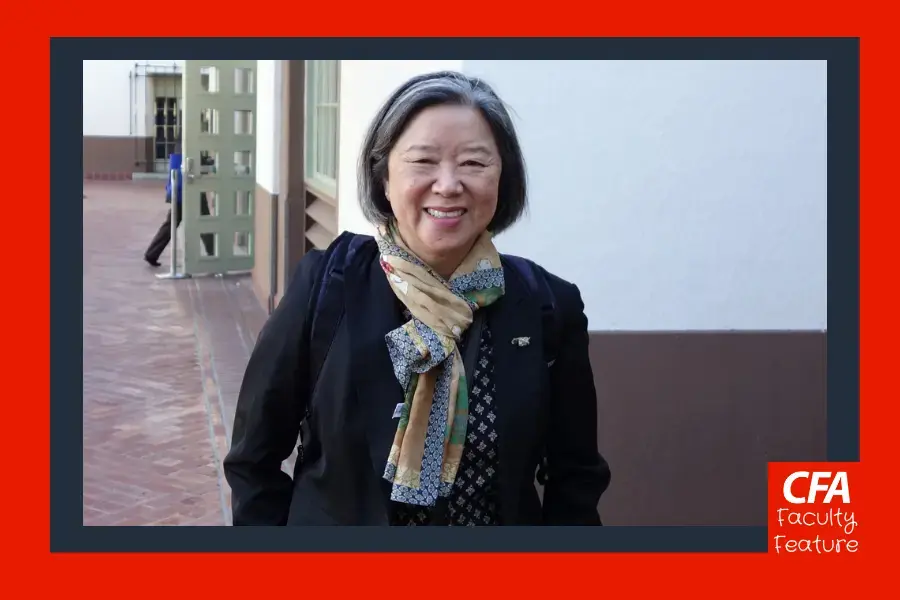Faculty Feature: CFA Los Angeles Member Focuses on the Overlooked by Leading with Dignity and Care
“When I came to Cal State LA in 1993, there was one course in Asian American studies,” remembers CSU Los Angeles Professor ChorSwang Ngin. “Ten faculty team members taught it pro bono.”
Things were feeling precarious.
Ngin had been hired in the anthropology program, so on top of her teaching and department duties, she started building up the Asian American Studies program.
“During my interview with the provost, she said, ‘Go and meet those folks down the hallway about Asia.’ That was it,” said Ngin. There was no faculty line for Asian American studies, no support, nothing. ”

She began meeting regularly with Ethnic Studies colleagues from their programs to strategize and build solidarity. It started with a National Endowment for the Humanities Faculty Focused Grant on Chinese and, generally, the Asian diaspora. A Ford Foundation grant also reinforced the early success Ngin was having. Eventually, Ngin started organizing an “Ethnic Studies coffee group” to concretize emerging collaborations and increase the program’s profile.
Like her courses and scholarly work, the collaboration was designed to think critically about diaspora linking Asian and Asian American Studies. However, even after establishing an Asian American Studies Bachelor of Arts, there was no funding for faculty and limited institutional support.
In 2011, the program was under threat and Ngin and others organized. In their view, diversity was under attack, so the natural response was to build a broad coalition-based movement to save and expand Asian American Studies. To Ngin’s delight, 72 campus leaders attended the first meeting to save the program.
As the campaign gained momentum, op-eds were written, and students asserted their agency and perspective. Ngin observed that “students from Chicano Studies, from Pan African Studies came with a consciousness around the power of activism, about advocacy. They signed a petition, made a website, and protested.” Since what felt like the brink, Asian American Studies have grown tremendously.
Recently, Ngin increased her advocacy profile by becoming a tri-chair for CFA’s Asian/Pacific Islander Desi American Caucus.
“ChorSwan is an amazing colleague with drive and determination. Seeing a need to be filled, ChorSwan was the driving force in creating a long-needed Faculty and Staff Association at CSULA,” said Lisa Kawamura, Cal Poly San Luis Obispo Chapter President and APIDA Caucus Tri-Chair. “I am so grateful that she has joined the APIDA Caucus at CFA and know she will continue to fill the needs of our community.”
As she prepares to retire, Ngin believes now is the perfect time to devote herself to fighting for the next aspirational faculty contract. “I have more time now to contribute my expertise and experience to support faculty colleagues the way they supported me,” said Ngin.
Before CSU Los Angeles, Ngin learned how to organize advocating for the globally displaced. “I started my work with the Vietnamese boat people. I went to refugee camps,” Ngin reflected.
When the World Bank was criticized for the displacement and often violence associated with funded development projects, individuals like Ngin were hired to provide appropriate compensation for those who were on track to be forcibly relocated. For Ngin, fair compensation needed to be “house for house, land for land, job for job.”
In these settings, the stakes were real, urgent, and measurable. “If you don’t set things up correctly, there’s an infectious disease outbreak.”
In China, Ngin worked with resettled populations. In many ways, she was one of the few suited to bring so many people together. “I’ve been to Indonesia on an international relations consulting project for the RAND Corporation. I grew up in Malaysia. I’ve been all over China. I speak multiple dialects and languages. I speak Indonesian. “
Ngin’s sensitivity towards the plight of the displaced led to her work with asylum seekers and eventually advocating for awareness and better treatment by literally writing the book on asylum seekers from Asia and one of the few books in general on the experience of asylum.
Looking at the world through the perspective of the displaced taught Ngin how to navigate powerful institutions and figures. It’s those same skills that she leaned on to advocate for Asian American studies at CSU Los Angeles and for a better contract.
“As an, as an ethnographer, as an anthropologist. I learn about people through my interviews. So, through my work, I know about the underbelly of society,” said Ngin.
At the CSU, the most displaced and overlooked tend to be contingent faculty and those from historically marginalized communities. Those are the folks Ngin is focused on as we head into bargaining. Ngin will continue advocating for a better CSU, leading with dignity and offering care.
Join California Faculty Association
Join thousands of instructional faculty, librarians, counselors, and coaches to protect academic freedom, faculty rights, safe workplaces, higher education, student learning, and fight for racial and social justice.